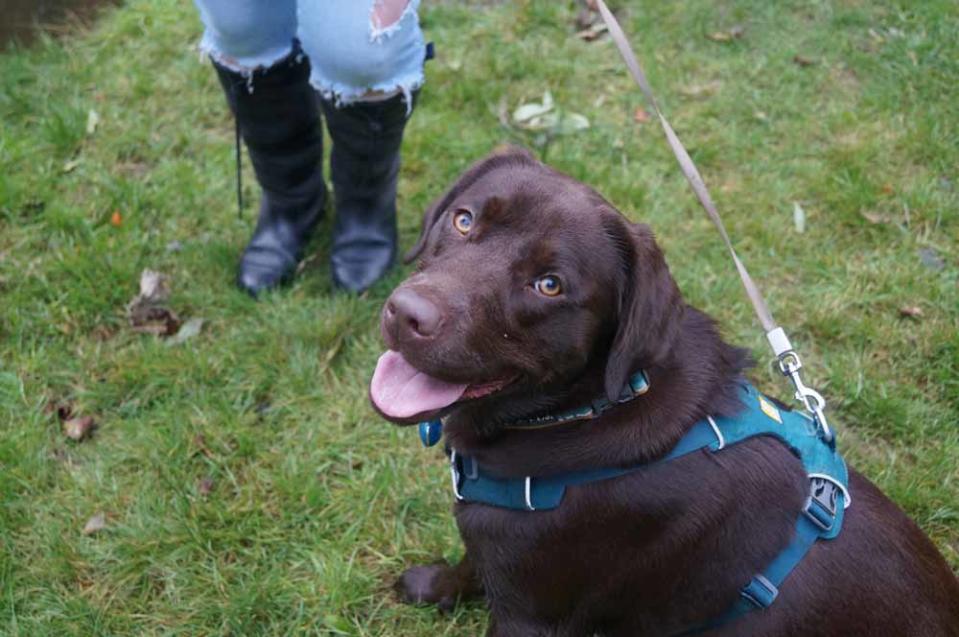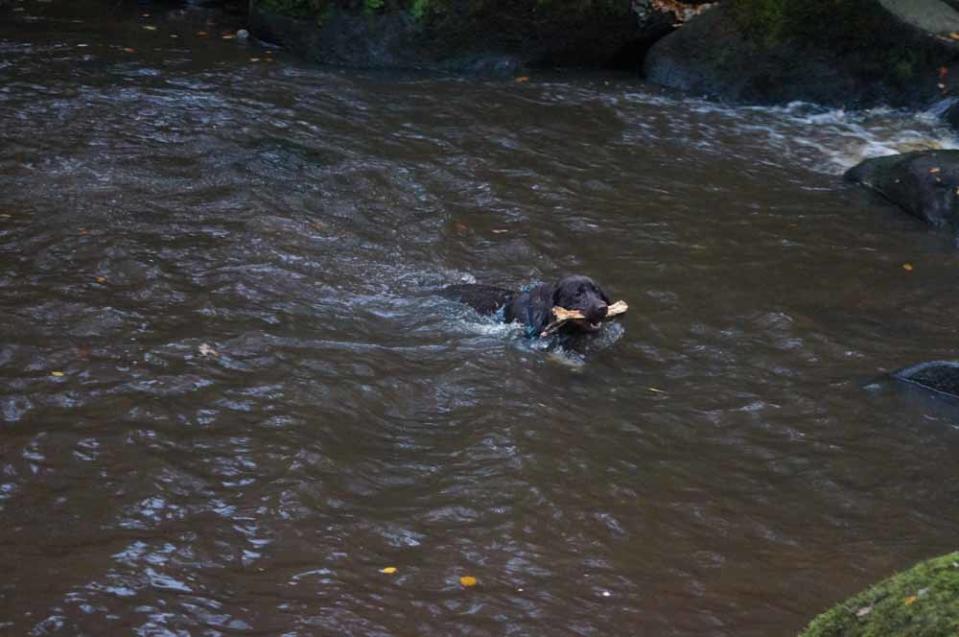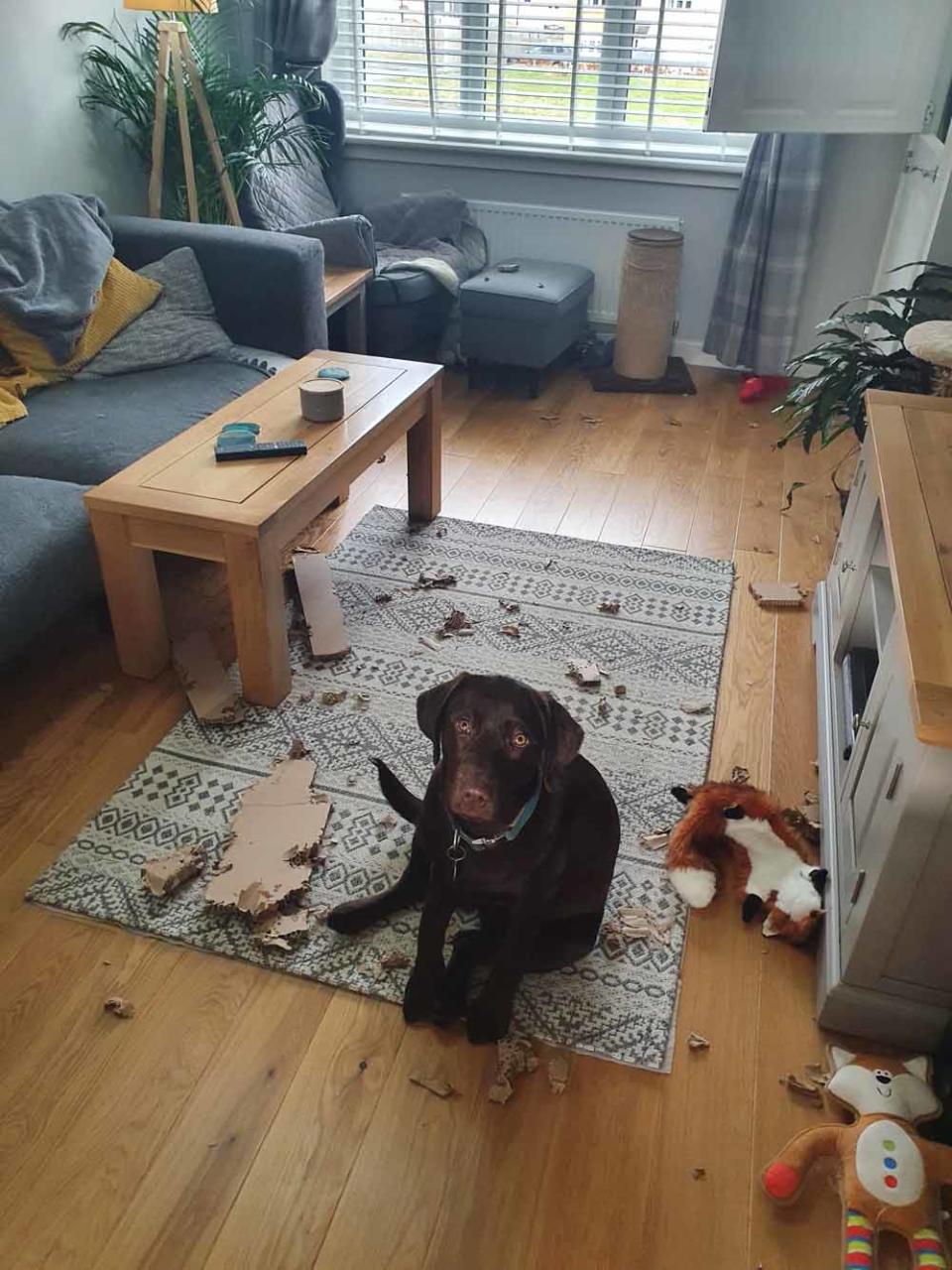Video: Labrador owner whose naughty pet became a star after training advocates puppy school as discussions about “ditching dogs” rise by 740 per cent
An animal lover whose dog grew from a scamp into a star thanks to training says dogs need school like all teen tearaways, after shocking figures showed a 740 per cent rise in discussions about “ditching dogs” since lockdown ended.
Already the proud owners of two cats, Laura Main, 35, and her partner, Gregg Ewans, 36, who both work in IT, could not wait to complete their family with a puppy.
Bringing chocolate Labrador Kiwi into the fold at eight and a half weeks old, she was an instant hit – even sparking interest from moggies Captain James Tiberius Kirk, 11, and Baby Miss, eight.
But, when Kiwi reached six months – the canine equivalent of adolescence – she turned into a tearaway, chewing walls, ceilings, plants and terrorising the cats at their home in Livingston, West Lothian, Scotland,
“Kiwi ate the walls, skirting board, armchair and even footstool,” laughed Laura.
“Lockdown definitely made it worse, as she wasn’t socialised like she would have been.”

She added: “But all dogs go through the adolescent stage, it doesn’t mean they’re uncontrollable.”
Rather than giving up, Laura swiftly booked Kiwi in for some puppy training and now feels she has a perfect pooch.
“I always wanted a dog,” she explained. “It wasn’t a sudden lockdown decision, we’d thought about it a lot and waited until we owned our home and were in a position to have a dog.”

She added: “It just happened to coincide with lockdown. We looked at dog shelters first, but it was hard to find a pet that would get along with our two cats.
“So, we settled on a breeder and signed up to adopt a chocolate Labrador puppy.”
Finally buying their first home in 2020, Laura and Gregg decided to get a chocolate Labrador, as the breed would best suit their lifestyle – bringing Kiwi home in the October.

“I was worried that Covid travel restrictions would stop us picking her up. But luckily, everything was fine and in October 2020 we finally got her,” said Laura.
“She was so tiny at eight weeks.
“But I think the issue is, you see adult dogs and puppies and you don’t see anything in between.”

She added: “You don’t realise they go through this completely different stage at six – 14 months, where they really are just full of energy.”
Laura’s puppy bubble was well and truly burst by her tearaway teen when Kiwi hit six months old and started misbehaving – jumping up at strangers on walks and tearing the house apart.
“Kiwi chewed everything,” she said. “She’d jump up at passers-by on walks and, though luckily she’s not a barky dog, she would get really excited at seeing strangers.”

She added: “She’s a social butterfly, really. She wants to say hello to everyone and is full of excitement. She lacks impulse control. It was a tough period as we learnt the best ways to train the behaviour.”
With a recent survey by charity Dogs Trust reporting that two million Brits became puppy owners during lockdown, only for conversations around ‘ditching dogs’ to increase by 740 per cent this summer, as people started returning to the office, Laura advocates training as a way to get through this difficult stage.
The charity says discussions about rehoming dogs have more than doubled in the same period, during which they have seen a 12 per cent increase in owners giving their pets up for adoption due to their behaviour.
Research the breed before adopting – different breeds come with different challenges, so be aware of what they are and think of strategies to deal with these.
Book them into puppy training – it is a great way to socialise, meet other dog owners and also learn to get through the terrible teens.
Train your friends, family and pets – it is a community effort and all your loved ones, including any additional pets, should be trained in how to behave to avoid boisterous jumps and excitable leaps.
Have a back to work plan – with lockdown easing and workers returning to the office make a plan of the routine you are going to have with your pup. Book in walkers and day care to ensure your furry friend gets all the exercise and attention they need while you are at work.
Ask for help – the dog community is amazing. Do not be scared to speak with other dog owners about the challenges you are facing or contact Dogs Trust for further support.
Admitting that lockdown made Kiwi’s behaviour harder to manage when she reached her doggy teens, Laura said: “We didn’t have people over in the normal way.
“She wasn’t as socialised as she would have been, and she wasn’t used to people in the same way she might have been if we had friends and family around the house.
“She’s still getting used to everything as it’s so different from when she was a puppy.”

Training was massively helpful to both the dog and her owners.
“When we took Kiwi to puppy training it was a big relief,” said Laura.
“When you’re out on walks you see mature dogs and puppies, you don’t see the adolescent stage and so you become convinced it’s just your dog.”

She added: “But going to puppy training made me realise it’s a natural stage that all dogs go through and that Kiwi was actually really well behaved.
“We found ways to curb her boisterous behaviour. We now spray our plants and furniture with sour apple spray which stops the chewing.
“I also took my mum to puppy training and we have trained our friends and family about how to interact with Kiwi.”

She added: “My mum trained my dad and we encourage our friends and family to be mindful about how they greet Kiwi, too.”
And as workers return to the office, Laura explains her strategy for balancing her work life with looking after her dog.
“We have a dog walker,” she said. “We’re lucky because Gregg and I work in IT and we work from home. We had started to set that up before Covid as we knew we wanted a dog.”

She added: “A dog walker comes every day and walks Kiwi. It’s fantastic as she gets to interact with other dogs and people. It’s a great way to socialise your pet.
“She’s very spoilt and also goes to puppy day care once or twice a week, so she gets to run around a lot.
“We have a really good routine, so Kiwi knows her dog walker really well and loves them so much.”

Laura – a first time dog owner herself – also insists that “puppy blues” are common amongst new pet owners.
“When you see puppies, you think it’s going to be wonderful,” she said.
“But the puppy blues are very real. It can be really tough, especially when they hit that six-month mark and become a teenager.”

She added: “It’s OK to feel frustrated. The best advice I can give is to get involved with people with dogs. Be part of the community because it makes such a difference.
“Giving your pet away should be a last resort, Kiwi was a handful as a teenager but she’s also amazing and so loving.
“We love her so much and even the cats get on with her now!”

Dr Jenna Kiddie, Head of Canine Behaviour at Dogs Trust says that, like any adolescents, young dogs can have challenging behaviour.
She said: “We want to reassure dog owners that it’s completely normal for their four-legged friends to go through a stage like this between the ages of six and 18 months. With the right training and support, it’s something that can be overcome.
“It’s heart-breaking to see the recent increase in people giving up their dogs due to behavioural issues. But Dogs Trust is on hand to offer tips and advice to support all dog owners – from the novice to the experienced – and we encourage anyone struggling with their pets’ behaviour to seek further support.”

 Yahoo Finance
Yahoo Finance 